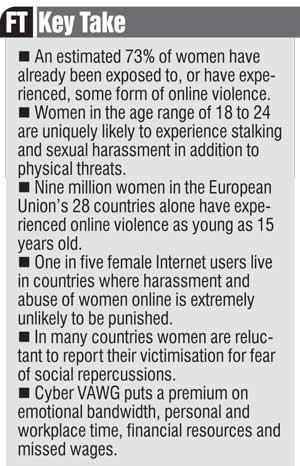Thursday Feb 19, 2026
Thursday Feb 19, 2026
Saturday, 26 September 2015 00:00 - - {{hitsCtrl.values.hits}}
By Uditha Jayasinghe
 A new report released by the United Nations Broadband Commission reveals that almost three quarters of women online have been exposed to some form of cyber violence, and urges governments and industries to work harder and more effectively together to better protect the growing number of women and girls who are victims of online threats and harassment.
A new report released by the United Nations Broadband Commission reveals that almost three quarters of women online have been exposed to some form of cyber violence, and urges governments and industries to work harder and more effectively together to better protect the growing number of women and girls who are victims of online threats and harassment.
The report notes that despite the rapidly growing number of women experiencing online violence, only 26% of law enforcement agencies in the 86 countries surveyed are taking appropriate action.
Entitled ‘Cyber Violence Against Women & Girls: A Worldwide Wake-Up Cal’l, experts hope the report will mobilise the public and private sectors to establish concrete strategies aimed at stemming the rising tide of online violence against women. Without concerted global action to curb the various escalating forms of online violence, an unprecedented surge of ‘cyber violence against women and girls (cyber VAWG)’ could run rampant and significantly impede the uptake of broadband by women everywhere, the report contends. It notes that cyber VAWG already exists in many forms, including online harassment, public shaming, the desire to inflict physical harm, sexual assaults, murders and induced suicides.
The rapid spread of the Internet means that effective legal and social controls of online anti-social and criminal behaviours continue to be an immense challenge. And in the age of the social Internet and ‘anywhere, anytime’ mobile access, cyber violence can strike at any time and can relentlessly follow its targets everywhere they go.
“In this report we’re arguing that complacency and failure to address and solve cyber violence could significantly impede the uptake of broadband services by girls and women worldwide,” said ITU Secretary-General Houlin Zhao, who serves as co-Vice Chair of the Broadband Commission, alongside UNESCO Director-General Irina Bokova. “The Net is an amazing resource for personal empowerment, and we need to ensure that as many girls and women as possible benefit from the amazing possibilities it offers.” The report presents a set of Key Recommendations, proposing a global framework based around three Ss – Sensitisation, Safeguards and Sanctions.
Sensitisation – Preventing cyber VAWG through training, learning, campaigning and community development to promote changes in social attitudes and behaviour.
Safeguards – Implementing oversight and maintaining a responsible Internet infrastructure through technical solutions and more informed customer care practices. Sanctions – Develop and uphold laws, regulations and governance mechanisms to deter perpetrators from committing these acts.
The report argues that rigorous oversight and enforcement of rules banning cyber VAWG on the internet will be an essential foundation stone if the internet is to become a safe, respectful and empowering space for women and girls, and, by extension, for boys and men.